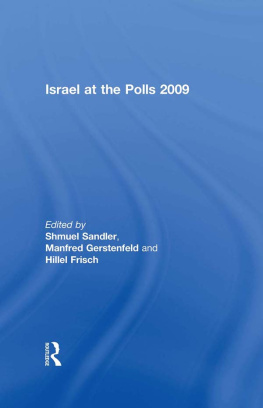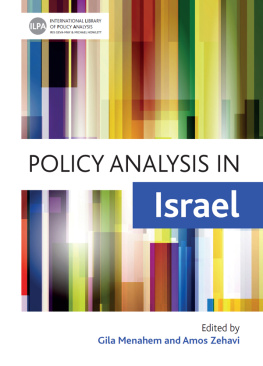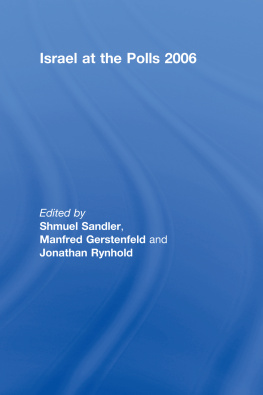Israel at the Polls 2009
This book describes political and sociological developments in Israel before and after the February 2009 elections, alongside an analysis of electoral trends. It provides an effective analysis of contemporary political and sociological Israeli history. Rather than focusing narrowly on electoral politics alone, this book broadens its focus to make it relevant to undergraduate and graduate students in Middle Eastern, Israeli and Jewish studies and the liberal arts.
Israel at the Polls has been updated and published annually for thirty years, providing readers with up-to-date analysis and continuity of scholarship; this book offers an expert long-term assessment of Israeli politics.
This book was published as a special issue of Israel Affairs.
Shmuel Sandler is the Dean of the Faculty of Social Sciences, and Sara and Simha Lainer Chair in Democracy and Civility, at Bar-Ilan University, and is a fellow of the Jerusalem Center for Public Affairs, Israel.
Manfred Gerstenfeld is Chairman of the Board of Fellows of the Jerusalem Center for Public Affairs in Israel, and an editor of the Jewish Political Studies Review.
Hillel Frisch is Associate Professor in the Departments of Political Science and Middle Eastern History, Bar-Ilan University, Israel.
Israel at the Polls 2009
Edited by Shmuel Sandler, Manfred Gerstenfeld and Hillel Frisch
First published 2011
by Routledge
2 Park Square, Milton Park, Abingdon, Oxon, OX14 4RN
Simultaneously published in the USA and Canada
by Routledge
270 Madison Avenue, New York, NY 10016
Routledge is an imprint of the Taylor & Francis Group, an informa business
2011 Taylor & Francis
This book is a reproduction of Israel Affairs, vol. 16, issue 1. The Publisher requests to those authors who may be citing this book to state, also, the bibliographical details of the special issue on which the book was based
Typeset in Times New Roman PS by Value Chain, India
Printed and bound in Great Britain by MPG Books Group, UK
All rights reserved. No part of this book may be reprinted or reproduced or utilised in any form or by any electronic, mechanical, or other means, now known or hereafter invented, including photocopying and recording, or in any information storage or retrieval system, without permission in writing from the publishers.
British Library Cataloguing in Publication Data
A catalogue record for this book is available from the British Library
ISBN13: 978-0-415-56065-8
CONTENTS
| Shmuel Sandler and Hillel Frisch |
| Manfred Gerstenfeld |
| Giora Goldberg |
| Abraham Diskin |
| Efraim Inbar |
| Asher Cohen and Bernard Susser |
| Vladimir (Ze'ev) Khanin |
| David Koren |
| Jonathan Rynhold |
| Ira Sharkansky |
| William F.S. Miles |
The 2009 Knesset elections: a foreign affairs perspective
Shmuel Sandler and Hillel Frisch
The 2009 Knesset elections: a foreign affairs perspective Israel's general elections in 2009 yielded three major outcomes: 1) the replacement of the bi-polar system that characterized Israeli electoral politics between 1977 and 2003 in which most parties are aligned to one of the two principal parties by a more flexible multiparty system. 2) The nearly total collapse of the Labor party and the Zionist left; for the first time since the 1920s, the Labor party was no longer a major political player, and 3) Kadima's electoral relative success, despite scandals haunting it since 2006. Kadima has basically superseded Labor without necessarily adopting its ideology. We argue (contrary to Henry Kissinger's quip that Israel never had a foreign policy but only a domestic policy) that primarily external factors and processes chiefly the failure of the Oslo process in the 1990s yielded these three outcomes.
The run-up to the elections: a political history of the 2009 campaign
Manfred Gerstenfeld
On 26 October 2008 President Shimon Peres called for new elections. The Knesset was dissolved on 11 November. Three candidates claimed that they were in the running for prime minister: Livni, Netanyahu and Barak. The election campaign would focus more on individuals than on parties. The security issue took high priority in the elections. A major issue throughout the campaign was the position of the leading parties on the establishment of two states for two peoples as part of a peace agreement. The internet became a major tool in the campaign. On the morning of 27 December, the IDF began a war in the Gaza Strip, which Israel called Operation Cast Lead. The major parties agreed to suspend their campaigns until the end of the war. Kadima's victory with 28 seats came as a surprise. The Likud came second with 27 seats, having lost voters at the end of the campaign to the third largest party Yisrael Beiteinu, which ended up with 15 Knesset seats. Looking back at the election campaign one can best define it as a broken and shortened one.
Kadima goes back: the limited power of vagueness
Giora Goldberg
Kadima lost the 2009 elections to the Likud after it had come to power in the 2006 elections. While Kadima only lost one seat (28 instead of 29), and even remained the largest party in the Knesset, it had no chance of remaining in power. Kadima is the most important phenomenon in the Israeli party system in recent years. Despite the fact that it did not win the 2009 elections its influence on the political system has been enormous. After its victory in 2006 Labour and Likud tried to copy it, as happens with every successful product. The best way to relate to Kadima is as a completely different phenomenon, in terms of the standard tools of the historical party map and the traditional division into blocs. This approach denies the former five conceptions of Kadima: a classic centre party, a neo-centrist party, a centrist party in the left bloc, a faction in the Likud or a middle party.
The Likud: the struggle for the centre
Abraham Diskin
In 1957 Downs claimed that most voters tend to hold centrist views. Hence, political parties should adopt centrist stands in order to attract as many voters as possible. Another aspect of the political centre derives from prominent theories on coalition formation: the political party that captures the median position in the parliament enjoys a tremendous advantage. The battle over the control of the centre played a major role in the strategy of Likud in the 2009 Knesset elections, and in its ability to form a coalition following the elections. Although Kadima won one more seat than Likud, it lost the battle on the centre. Netanyahu, loyal to his centrist tendencies during the campaign, preferred to have only a segment of Labour in his coalition, at the cost of five ministerial posts, rather than to enjoy the support of the radical National Union at the cost of a single ministerial post.
The decline of the Labour party
Efraim Inbar
This article presents the main reasons for the gradual decline, and eventually the marginalization, of the Labour Party. It starts with a general discussion of the decline of dominant parties in democratic political systems followed by a review of Labour's decline. Then it proceeds to analyze in detail the reasons for Labour losing its centrality in Israeli politics. The article concludes with a few thoughts about the future of Israeli politics.









